北师大初二英语上册重点语法
- 格式:doc
- 大小:49.00 KB
- 文档页数:5
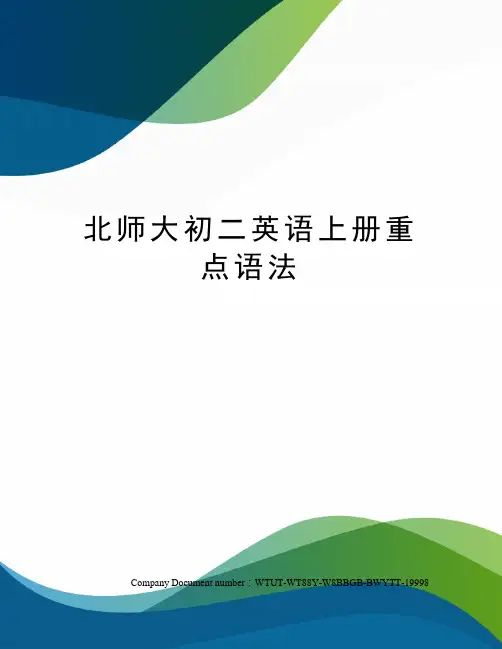
北师大初二英语上册重点语法Company Document number:WTUT-WT88Y-W8BBGB-BWYTT-19998北师大初二英语上册重点语法(一)一般将来时一般将来时表示将来某个时间要发生的动作或者存在的状态。
通常与表示将来的时间状语连用,如tomorrow, the day after tomorrow, next year, next month, next week, in 100 years等。
be going to do (动词原形)结构:表示打算、准备做的事情或者肯定要发生的事情。
如:It is going to rain.will do 结构表示将来的用法:1. 表示预见Do you think it will rainYou will feel better after a good rest.2. 表示意图I will borrow a book from our school library tomorrow.What will she do tomorrow基本构成如下:一般疑问句构成:(1)will+主语+do… Will Sarah come to visit me next Sunday(2)there be 结构的一般疑问句:Will there + be …Will there be fewer trees Yes, there will. / No, there won’t否定句构成:will + not (won’t)+doSarah won’t come to visit me next Sunday.特殊疑问句构成:特殊疑问词+will+主语+…What will Sarah do next Sunday★★练一练★★根据例句,用will改写下列各句例:I don’t feel well today. (be better tomorrow)I’ll be better tomorrow.1. Gina has six classes today. (have a lot of homework tonight)_____________________________2. I’m tired now. (sleep later)_____________________________3. My parents need a new car. (buy one soon)_____________________________4. We can’t leave right now. (leave a little later)_____________________________5. The weather is awful today. (be better tomorrow)_____________________________(二)should的用法:should用来提出建议和忠告,后边加动词原形,否定句直接在should后边加not.例如:I think you should eat less junk food.我认为你应该少吃垃圾食品。
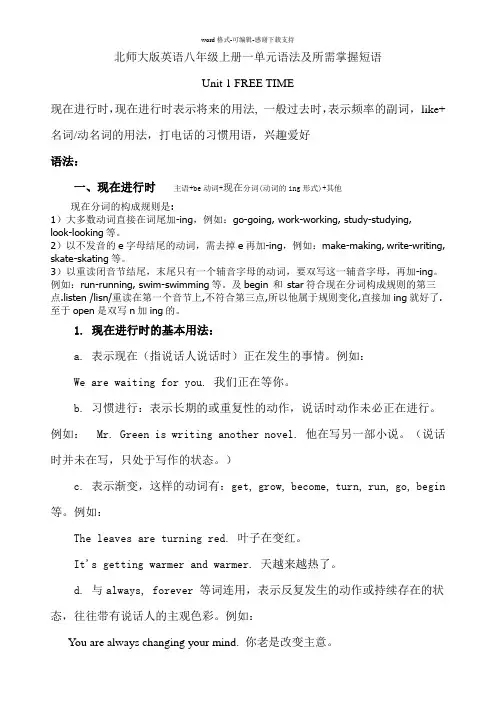
北师大版英语八年级上册一单元语法及所需掌握短语Unit 1 FREE TIME现在进行时,现在进行时表示将来的用法, 一般过去时,表示频率的副词,like+名词/动名词的用法,打电话的习惯用语,兴趣爱好语法:一、现在进行时主语+be动词+现在分词(动词的ing形式)+其他现在分词的构成规则是:1)大多数动词直接在词尾加-ing,例如:go-going, work-working, study-studying,look-looking等。
2)以不发音的e字母结尾的动词,需去掉e再加-ing,例如:make-making, write-writing, skate-skating等。
3)以重读闭音节结尾,末尾只有一个辅音字母的动词,要双写这一辅音字母,再加-ing。
例如:run-running, swim-swimming等。
及begin 和star符合现在分词构成规则的第三点.listen /lisn/重读在第一个音节上,不符合第三点,所以他属于规则变化,直接加ing就好了.至于open是双写n加ing的。
1. 现在进行时的基本用法:a. 表示现在(指说话人说话时)正在发生的事情。
例如:We are waiting for you. 我们正在等你。
b. 习惯进行:表示长期的或重复性的动作,说话时动作未必正在进行。
例如:Mr. Green is writing another novel. 他在写另一部小说。
(说话时并未在写,只处于写作的状态。
)c. 表示渐变,这样的动词有:get, grow, become, turn, run, go, begin 等。
例如:The leaves are turning red. 叶子在变红。
It's getting warmer and warmer. 天越来越热了。
d. 与always, forever 等词连用,表示反复发生的动作或持续存在的状态,往往带有说话人的主观色彩。
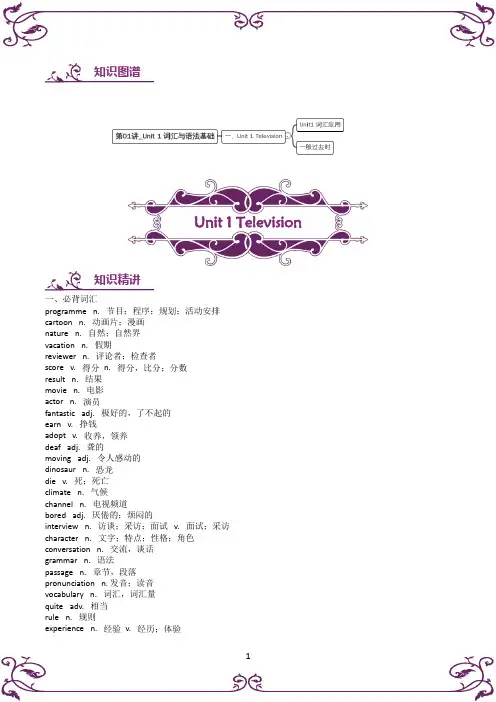
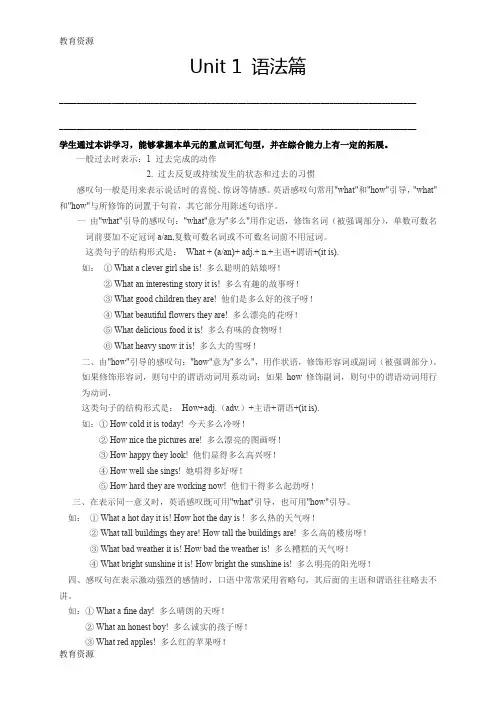
Unit 1 语法篇____________________________________________________________________________________________________________________________________________________________________学生通过本讲学习,能够掌握本单元的重点词汇句型,并在综合能力上有一定的拓展。
一般过去时表示:1 过去完成的动作2. 过去反复或持续发生的状态和过去的习惯感叹句一般是用来表示说话时的喜悦、惊讶等情感。
英语感叹句常用"what"和"how"引导,"what"和"how"与所修饰的词置于句首,其它部分用陈述句语序。
一由"what"引导的感叹句:"what"意为"多么"用作定语,修饰名词(被强调部分),单数可数名词前要加不定冠词a/an,复数可数名词或不可数名词前不用冠词。
这类句子的结构形式是:What + (a/an)+ adj.+ n.+主语+谓语+(it is).如:① What a clever girl she is! 多么聪明的姑娘呀!② What an interesting story it is! 多么有趣的故事呀!③ What good children they are! 他们是多么好的孩子呀!④ What beautiful flowers they are! 多么漂亮的花呀!⑤ What delicious food it is! 多么有味的食物呀!⑥ What heavy snow it is! 多么大的雪呀!二、由"how"引导的感叹句:"how"意为"多么",用作状语,修饰形容词或副词(被强调部分)。
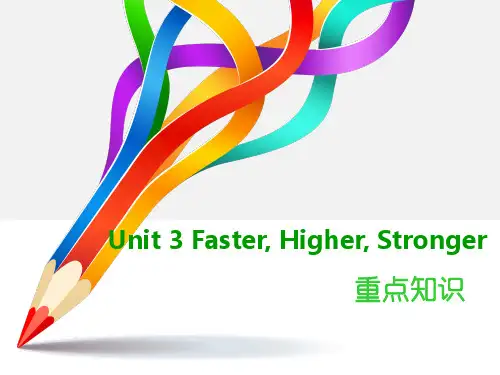
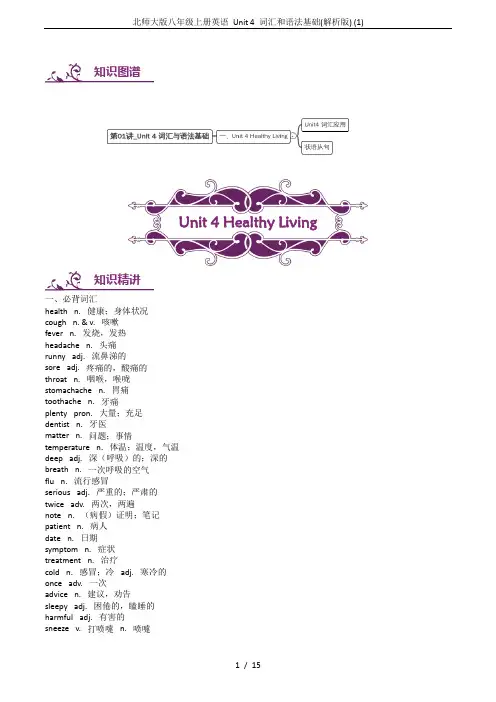
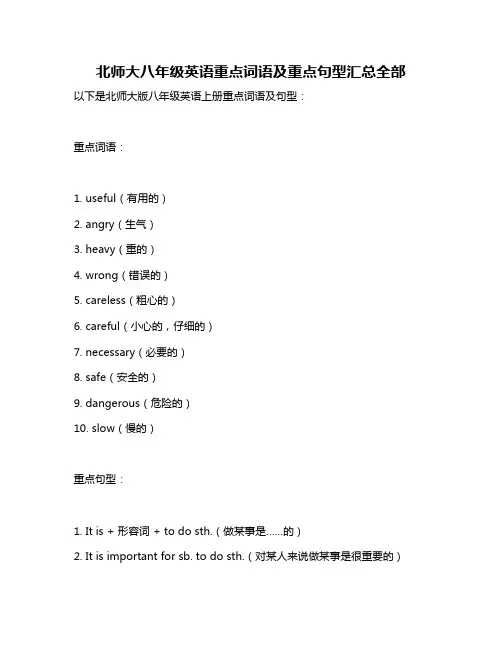
北师大八年级英语重点词语及重点句型汇总全部以下是北师大版八年级英语上册重点词语及句型:
重点词语:
1. useful(有用的)
2. angry(生气)
3. heavy(重的)
4. wrong(错误的)
5. careless(粗心的)
6. careful(小心的,仔细的)
7. necessary(必要的)
8. safe(安全的)
9. dangerous(危险的)
10. slow(慢的)
重点句型:
1. It is + 形容词 + to do sth.(做某事是……的)
2. It is important for sb. to do sth.(对某人来说做某事是很重要的)
3. It is + 形容词 + that + 主语 + should do sth.(主语应该做某事是很……的)
4. It is time for sb. to do sth.(是某人做某事的时间了)
5. It is time + for + sth.(是……的时间了)
6. It is time + that + 主语 + should do sth.(主语应该做某事的时间到了)
7. It is + 形容词 + when + 从句(当……的时候是……的)
8. It is + 形容词 + not to do sth.(不做某事是……的)
9. It is + 形容词+ not until… that + 主语 + should do sth.(直到……主
语才应该做某事)
10. It is + 形容词 + of sb. to do sth.(某人做某事是……的)
以上是北师大版八年级英语上册的重点词语和句型,希望对您有所帮助。
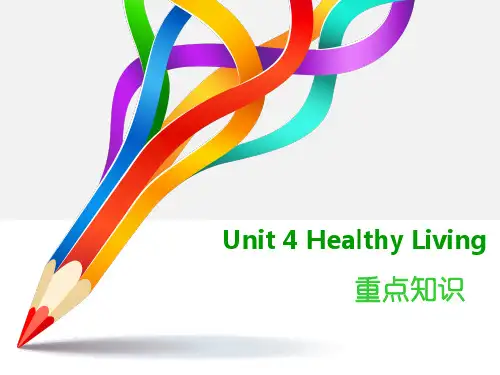
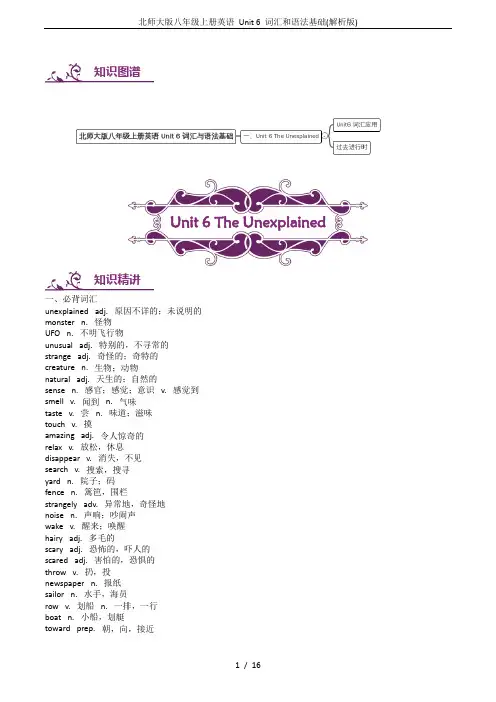
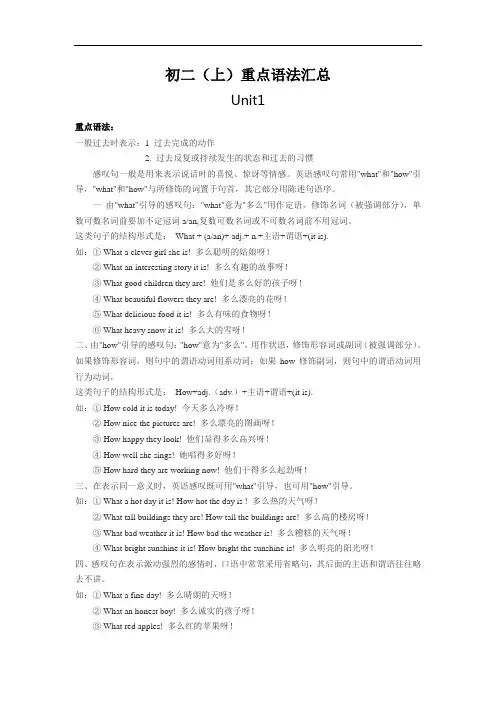
初二(上)重点语法汇总Unit1重点语法:一般过去时表示:1 过去完成的动作2. 过去反复或持续发生的状态和过去的习惯感叹句一般是用来表示说话时的喜悦、惊讶等情感。
英语感叹句常用"what"和"how"引导,"what"和"how"与所修饰的词置于句首,其它部分用陈述句语序。
一由"what"引导的感叹句:"what"意为"多么"用作定语,修饰名词(被强调部分),单数可数名词前要加不定冠词a/an,复数可数名词或不可数名词前不用冠词。
这类句子的结构形式是:What + (a/an)+ adj.+ n.+主语+谓语+(it is).如:① What a clever girl she is! 多么聪明的姑娘呀!② What an interesting story it is! 多么有趣的故事呀!③ What good children they are! 他们是多么好的孩子呀!④ What beautiful flowers they are! 多么漂亮的花呀!⑤ What delicious food it is! 多么有味的食物呀!⑥ What heavy snow it is! 多么大的雪呀!二、由"how"引导的感叹句:"how"意为"多么",用作状语,修饰形容词或副词(被强调部分)。
如果修饰形容词,则句中的谓语动词用系动词;如果how修饰副词,则句中的谓语动词用行为动词,这类句子的结构形式是:How+adj.(adv.)+主语+谓语+(it is).如:① How cold it is today! 今天多么冷呀!② How nice the pictures are! 多么漂亮的图画呀!③ How happy they look! 他们显得多么高兴呀!④ How well she sings! 她唱得多好呀!⑤ How hard they are working now! 他们干得多么起劲呀!三、在表示同一意义时,英语感叹既可用"what"引导,也可用"how"引导。
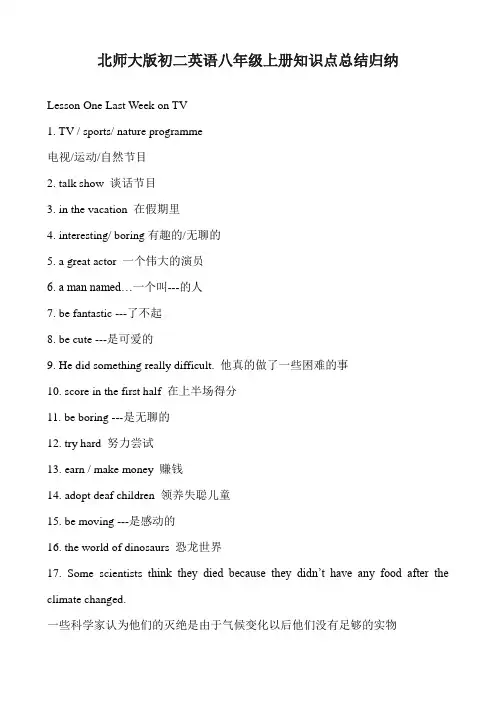
北师大版初二英语八年级上册知识点总结归纳Lesson One Last Week on TV1. TV / sports/ nature programme电视/运动/自然节目2. talk show 谈话节目3. in the vacation 在假期里4. interesting/ boring有趣的/无聊的5. a great actor 一个伟大的演员6. a man named…一个叫---的人7. be fantastic ---了不起8. be cute ---是可爱的9. He did something really difficult. 他真的做了一些困难的事10. score in the first half 在上半场得分11. be boring ---是无聊的12. try hard 努力尝试13. earn / make money 赚钱14. adopt deaf children 领养失聪儿童15. be moving ---是感动的16. the world of dinosaurs 恐龙世界17. Some scientists t hink they died because they didn’t have any food after the climate changed.一些科学家认为他们的灭绝是由于气候变化以后他们没有足够的实物18. be about…关于--What was it about? 它是关于什么的?19. bored/ boring;感到厌烦的/ 令人厌烦的interested/ interesting; 对—有兴趣/ 有意思的excited/exciting 激动地,兴奋地/令人激动的,兴奋地20.act/ play well 演得好21. Can I have the bill, please? 请给我账单好吗?Lesson TwoAn Interview on TV1. Language learning characters, conversation, grammar, listening, passage, pronunciation, reading, speaking, vocabulary, writing2. Chinese characters 汉字3. learn to do sth. 学习做某事4. grammar rules 语法规则5. be hard to do 做某事有困难6. read an interesting passage 读一段有趣的文章7. have a conversation about… 有一个关于---的对话8. ask sb. about sth. 询问某人某事9. Did you know any Chinese before you came to China?在你来中国之前你了解中文吗?No, I didn’t know a word of Chinese.不,我一个字也不认识10. watch TV programmes 看电视节目11. help sb. do sth. 帮助某人做某事12. simple conversations 简单的对话13. take a lot of practice 做大量练习14. learn sth. from... 从---学习---/ 向某人学习15. learn Chinese at university 在大学学习汉语16. enjoy one’s Ch inese class 喜欢某人的汉语课17. listen to the teacher carefully 认真听老师讲课18. take notes 记笔记Taking notes is also very important 记笔记也非常重要Lesson ThreeThe Big Game1.Look at the speed of Hill as he runs down the field with the ball.看希尔在球场带球奔跑的速度2. be fit=be healthy 保持健康3. be hurt 受伤4. be out for two months 出局两个月5. pass …to… 把---传给-----6. What a great kick! 多棒的进球啊!7. be perfect 是完美的8. make a basket 投篮得分9. Are you kidding me? 你在开玩笑吗?10. That was a bad call. 那真是糟糕的判罚11. What a shame! 多遗憾啊!12. complain about… 抱怨某事13. hit the ball to the back of the court 将球击倒后场14. be in top form 状态很好She is really in top form today. 他今天状态真的很好。
知识图谱Unit 2 Teams知识精讲一、必背词汇play n. 戏剧v. 玩experiment n. 实验;试验musical adj. 音乐的instrument n. 乐器teamwork n. 协同工作,配合bottle n. 瓶子camera n. 照相机chopsticks n. 筷子glue n. 胶水metal n. 金属paper n. 纸;纸张plastic n. 塑料wood n. 木头material n. 材料object n. 物品,东西;目标build v. 建筑;建造describe v. 描述video n. 录像v. 录像second n. 秒;第二possible adj. 可能return v. 还回;回来n. 返回seat n. 座位,坐处exam n. 考试together adv. 在一起,到一起role n. 角色;职能question v. 提问;质疑n. 问题discussion n. 讨论,商讨research n. 研究,调查v. 进行研究;调查alone adv. 独自;仅仅adj. 独自的,孤单的share v. 分享;共有;有相同之处anyone pron. 任何人mind v. 介意hate v. 讨厌,厌恶;憎恨sound v. 听起来好像;听起来n. 声音crazy adj. 疯狂的;荒唐的;狂热的stick n. 棍;条v. 粘贴argue v. 争论,争辩choose v. 选择suggest v. 建议,提议excellent adj. 优秀的,杰出的,极好的poor adj. 差的;贫穷的participate v. 参加,参与task n. 任务,工作;活动stand v. 容忍;忍受;站立speech n. 演讲;发言special adj. 特殊的,特别的last v. 持续,延续couple n. 夫妻resort n. 旅游胜地shake v. 摇动,抖动completely adv. 彻底地,完全地earthquake n. 地震dark adj. 黑暗的heavily adv. 超出一般规模地;重重地moment n. 片刻;瞬间decide v. 决定until prep. ,conj. 直到ruin n. 废墟blanket n. 毯子,毛毯enough adj. 足够的divide v. (使)分开,分散collect v. 收集flashlight n. 手电筒flash v. (使)闪耀,闪光journey n. 旅行,行程encourage v. 鼓励support v & n. 支持safely adv. 安全地;平安地lucky adj. 幸运的hope n & v. 希望solve v. 解决,处理problem n. 问题;困难into prep. 到……里面;朝,向astronaut n. 宇航员,航天员several det. 几个;一些everybody pron. 每人;人人cooperate v. 合作,协作puzzle n. 谜,智力问题;疑问discuss v. 讨论,商量band n. 乐队二、重点词汇1. describe verb /dɪˈskraɪb/to say or write what someone or something is like描述,描写,描绘例句:Could you describe your attacker?你能描述一下袭击者的样子吗?He described the painting in detail.他详细地描述了那幅油画的内容。
八年级北师大版英语上册各单元知识点第一单元:个人信息
介绍自己的姓名、年龄、国籍等个人信息
学习正确的问候和告别方式
熟练使用形容词来描述人物特征和外貌
第二单元:学校生活
学习表达学科名称和教室用具的英文
掌握询问日常活动以及喜好的句型
学习谈论课堂活动和学习方法
第三单元:家庭与朋友
描述家庭成员关系,包括父母、兄弟姐妹等
学习询问和回答他人的家庭状况
掌握描述朋友特征和爱好的表达方式
第四单元:食物与健康
学习食物名称和饮食习惯的表达
掌握询问和回答关于食物喜好和健康习惯的问题
学习描述食物的味道和口感的形容词
第五单元:节日与传统
了解并描述中国和西方一些重要节日
学习相关节日的习俗和庆祝活动
掌握表达节日祝福和参与庆祝的方式
第六单元:旅行与交通
学习描述不同交通工具和旅行方式
掌握询问和提供关于旅行计划和经验的信息
熟练使用方位介词来描述地点和方向
第七单元:购物与服务
学习购物场所和商品名称的表达
掌握询问和提供购物意见的句型
熟练使用数词和货币单位进行购物交流
第八单元:娱乐与休闲
描述喜欢的娱乐活动和休闲方式
学习询问和回答关于兴趣爱好的问题
掌握描述体育项目和音乐风格的表达方式
以上是八年级北师大版英语上册各单元的主要知识点,希望对你有所帮助!如有需要,请随时提问。
八年级上北师大版英语Unit 1 复习提纲一、重点短语归纳1. be ready to do sth 准备做某事2. in the future 在未来3. have a chance to do sth 有机会做某事4. make a decision 做出决定5. in half an hour 在半小时内6. see sb doing sth 看见某人正在做某事7. in the past 在过去8. in the last few years 在过去的几年里9. take sb to + 地点把某人带到某地10. be + 数字+ years old ……岁11. in one’s + 数字 + th year 在某人……岁的时候12. be + 形容词 + to do sth 做某事是……的13. have a good time = enjoy oneself = have fun 玩得开心14. be born 出生15. will + 动词原形将要做某事16. was/were born in 出生于……17. be different from 与……不同18. send sb to + 地点把某人送到某地19. be interested in 对……感兴趣20. be famous for 因……而著名21. be/get ready to do sth 准备做某事22. used to do sth 过去常常做某事23. in the north of China 在中国的北部24. in the south of China 在中国的南部25. on the east coast of China 在中国东海岸26. on the west coast of China 在中国西海岸27. pay for 为……付钱28. spend + 时间/金钱 + (in) doing sth 花时间/金钱做某事29. take + 时间/金钱 + to do sth 花时间/金钱做某事30. spend + 时间/金钱 + on + 物花时间/金钱在某物上。
Unit1一般过去时及感叹句Lesson one1.take notes记笔记2.between---and---在—和—之间3.among三者以上之中4.sports programme体育节目5.talk show访谈节目6.nature programme自然节目7.game show游戏节目8.in the first half在上半场9. a man named---一个叫—的人10.do something difficult做有难度的事情11.be interested in sth对—感兴趣12.adopt deaf children收养失聪儿童13.the world of dinosaurs恐龙世界Lesson two1.on the internet通过网络2.ask sb about sth问某人有关某事3.do lots of listening做大量的听力练习4.Chinese writing汉语写作5.Chinese characters 汉字6.high school中学7.take notes记笔记8.listen to the teacher carefully认真听课9.in his cousin’s room在他表弟的房间10.have an interview with sb采访某人11.have an interview for a job对某工作的面试12.also , too, as well, either的区别Lesson 31.score a goal 进球得分2.hurt his foot脚受伤3.make a basket投篮得分4.hit the ball to the back of the court击球到场地后方5.run down the field with the ball带球在场地奔跑6.agree with sb同意某人7.agree on sth在某方面意见一致8.agree to do sth同意做某事9.think about想一想,考虑10.think of想起认为11.think over仔细考虑12.pass ---to—把--- 传给13.another two points=two more points14.What a great kick!多棒的一个射门!15.a bad call 一个糟糕的判决plain about抱怨17.in top form状态很好18.How exciting!真令人兴奋!19.break leg摔断腿20.win first prize获得一等奖21.do well on our tests在考试中做的好22.What a shame!真遗憾!Communication workshop1.enjoy doing sth喜欢做某事2.enjoy oneself=have a good time=have fun3.magic show魔术表演4.Many other kinds of 许多其他种类5.out of all these在这所有的中6.help sb (to)do sth帮助某人做某事7.help sb with sth在某方面帮助某人8.help oneself to sth随便吃—9.can’t help doing sth禁不住做---10.run after追逐11.get close to接近12.continue to do sth继续做某事13.continue with sth继续某事14.for a long time很长时间15.That’s why+从句:这就是---的原因16.in the wild在野外,在自然环境下17.fall asleep入睡18.if主将从现19.by +doing sth通过做某事20.give up doing sth放弃做某事21.turn on打开+电器22.open+门,窗之类的23.on/in/ at24.would like to do sth愿意做某事25.Would you like sth? ---Yes, please. / No, thanks.26.Would you like to do sth? ----Yes, I’d love to, but I’mbusy.27.there be 句型28.find out发现,找出look for寻找29.be on上演30.not---until直到---才31.a pair of一双,副----Unit 2情态动词的用法:can, must, have toLesson 41.act in a play表演戏剧2. play chess下象棋3. do a class project进行班级活动4. do a science experiment做科学实验5. play a musical instrument in a concert在音乐会上演奏乐器6. Teamwork is important for playing football.协同工作对踢足球非常重要。
北师大初二英语上册重点语法The saying "the more diligent, the more luckier you are" really should be my charm in2006.北师大初二英语上册重点语法一一般将来时一般将来时表示将来某个时间要发生的动作或者存在的状态;通常与表示将来的时间状语连用,如tomorrow, the day after tomorrow, next year, next month, next week, in 100 years等;be going to do 动词原形结构:表示打算、准备做的事情或者肯定要发生的事情;如:It is going to rain.will do 结构表示将来的用法:1. 表示预见Do you think it will rainYou will feel better after a good rest.2. 表示意图I will borrow a book from our school library tomorrow.What will she do tomorrow基本构成如下:一般疑问句构成:1will+主语+do… Will Sarah come to visit me next Sunday2there be 结构的一般疑问句:Will there + be …Will there be fewer trees Yes, there will. / No, there won’t否定句构成:will + not won’t+doSarah won’t come to visit me next Sunday.特殊疑问句构成:特殊疑问词+will+主语+…What will Sarah do next Sunday★★练一练★★根据例句,用will改写下列各句例:I don’t feel well today. be better tomorrowI’ll be better tomorrow.1. Gina has six classes today. have a lot of homework tonight_____________________________2. I’m tired now. sleep later_____________________________3. My parents need a new car. buy one soon_____________________________4. We can’t leave right now. leave a little later_____________________________5. The weather is awful today. be better tomorrow_____________________________二should的用法:should用来提出建议和忠告,后边加动词原形,否定句直接在should后边加not.例如:I think you should eat less junk food.我认为你应该少吃垃圾食品;She drives a lot and she seldom walks. So I think she should walk a lot.她经常开车,很少走路;所以我认为她应该多走路;Students shouldn’t spend too much time playing computer games.学生们不应当花太多的时间玩计算机游戏;学习向别人提建议的几种句式:1I think you should…2Well, you could…3Maybe you should …4Why don’t you…5What about doing sth.6You’d better do sth.★★练一练★★用should或shouldn’t填空1. I can’t sleep the night before exams.You ______ take a warm shower before you go to bed.2. Good friends ______ argue each other.3. There is little milk in the glass. We _______ buy some.4. They did n’t invite you Maybe you ______ be friendlier.5. I am a little bit overweight. So I think I _______ do exercises every day.三过去进行时过去进行时表示过去某一点时间正在进行的动作或者过去某一段时间内一直进行的动作;1. 构成was /were + doing,例如:I was watching TV at 9 o’clock last night.at 9 o’clock last night是时间点They were playing football all afternoon.all afternoon是时间段2. 过去进行时的标志词at 8 o’clock last night, this time yesterday等;例如:I was having lunch at home this time yesterday.昨天的这个时候我正在吃午饭;At that time she was writing a book.那阵子她在写一本书;表示她在那段时间里一直在做那件事情;★★练一练★★用括号中所给动词的适当形式填空;1. This time yesterday I ____ ______readbooks.2. At 9 o’clock last Sunday th ey ______ ______havea party.3. When I _____comeinto the classroom, she ________ ______reada storybook.4. She _____ ______playcomputer games while her mother __________cookyesterday afternoon.5. I _____ ______havea shower when you _______callme yesterday.四间接引语形成步骤:1不要逗号,冒号,引号2要考虑到人称的变化人称的变化与汉语是一致的 3要考虑时态的变化4要考虑时间状语、地点状语和语示代词的变化;1. 直接引语变成间接引语时,几个主要时态的变化规律直接引语间接引语一般现在时一般过去时一般将来时过去将来时现在进行时过去进行时2. 直接引语变成间接引语时,一些词汇的变化规律直接引语1. am / is2. are3. have / has4. will5. can6. may间接引语1. was2. were3. had4. would5. could6. might★★练一练★★用括号中所给动词的适当形式填空;1. She said I _____behard-working.2. Peter told me he _____bebored yesterday.3. She said she _____goswimming last Sunday.4. Bobby said he _____maycall me later.5. Antonio told me he _____reada book then.请转述他人说的话:1. I go to the beach every Saturday. Tom2. I can speak three languages. Lucy3. I will call you tomorrow. Mike4. I’m having a surprise party for Lana. she五if引导的条件状语从句结构:if+一般现在时,主语+将来时含义:如果……,将要……例如:If you ask him, he will help you.如果你请求他,他会帮助你;If needed, we’ll work all night.如果需要,我们就干个通宵;★★练一练★★根据中文提示,完成句子;1. 如果你参加聚会,你将会过得很开心;If you ________ the party, you __________.2. 如果明天下雨,我们将不去野餐;If it __________ tomorrow, we ___________.3. 如果你经常听英文歌,你将会喜欢英语的;If you often ________, you _________________.请根据内容从所给的15个单词中选出最恰当的10个填入空白处,使短文完整,有些词要根据需要作适当的词形变化;than, so, tell, us, them, report, beause, love, composition, understand, to, that, much, for, whatA generation gap 代沟has become a serious problem. I read a _______1about it in the newspaper. Some children have killed _______2after quarrels 争吵with parents. I think this is _______3they don’t have a good talk with each other. Parents now spend _______4time in the office. _______5they don’t have much time to stay with their children. As time passes, they both feel _______6they do n’t have the same topics话题to talk about. I want to _______7parents to be more with your children, get to know them and understand them. And for children, show your feeling _______8your parents. They are the people who _______9you. So tell them your thoughts 想法. In this way, you can have a better _______10of each other.答案:1. She’ll have a lot of homework tonight.2. I’ll sleep later.’ll buy one soon.4. We’ll leave a little later.5. Maybe it’ll be better tomorrow.答案:1. should 2. shouldn’t 3. should 4. should 5. should答案:1. was reading 2. were having 3. came; was reading4. was playing; was cooking5. was having; called答案:1. was 2. was 3. went 4. might 5. was reading答案:1. If you go to the party, you will have a good time2. If it rains tomorrow, we won’t go to the picnic3. If you often listen to English songs, you’ll like English19|评论。
北师大初二英语上册重点语法(一)一般将来时一般将来时表示将来某个时间要发生的动作或者存在的状态。
通常与表示将来的时间状语连用,如tomorrow, the day after tomorrow, next year, next month, next week, in 100 years等。
be going to do (动词原形)结构:表示打算、准备做的事情或者肯定要发生的事情。
如:It is going to rain.will do 结构表示将来的用法:1. 表示预见Do you think it will rain?You will feel better after a good rest.2. 表示意图I will borrow a book from our school library tomorrow.What will she do tomorrow?基本构成如下:一般疑问句构成:(1)will+主语+do…? Will Sarah come to visit me nex t Sunday?(2)there be 结构的一般疑问句:Will there + be …?Will there be fewer trees? Yes, there will. / No, there won’t否定句构成:will + not (won’t)+doSarah won’t come to visit me next Sunday.特殊疑问句构成:特殊疑问词+will+主语+…?What will Sarah do next Sunday?★★练一练★★根据例句,用will改写下列各句例:I don’t feel well today. (be better tomorrow)I’ll be better tomorrow.1. Gina has six classes today. (have a lot of homework tonight)_____________________________2. I’m tired now. (sleep later)_____________________________3. My parents need a new car. (buy one soon)_____________________________4. We can’t leave right now. (leave a little later)_____________________________5. The weather is awful today. (be better tomorrow)_____________________________(二)should的用法:should用来提出建议和忠告,后边加动词原形,否定句直接在should后边加not.例如:I think you should eat less junk food.我认为你应该少吃垃圾食品。
She drives a lot and she seldom walks. So I think she should walk a lot.她经常开车,很少走路。
所以我认为她应该多走路。
Students shouldn’t spend too much time playing computer games.学生们不应当花太多的时间玩计算机游戏。
学习向别人提建议的几种句式:(1)I think you should…(2)Well, you could…(3)Maybe you should …(4)Why don’t you…?(5)What about doing sth.?(6)You’d better do sth.★★练一练★★用should或shouldn’t填空1. I can’t sleep the night before exams.You ______ take a warm shower before you go to bed.2. Good friends ______ argue each other.3. There is little milk in the glass. We _______ buy some.4. They didn’t invite you? Maybe you ______ be friendlier.5. I am a little bit overweight. So I think I _______ do exercises every day. (三)过去进行时过去进行时表示过去某一点时间正在进行的动作或者过去某一段时间内一直进行的动作。
1. 构成was /were + doing,例如:I was watching TV at 9 o’clock last night.at 9 o’clock last night是时间点They were playing football all afternoon.all afternoon是时间段2. 过去进行时的标志词at 8 o’clock last night, this time yesterday等。
例如:I was having lunch at home this time yesterday.昨天的这个时候我正在吃午饭。
At that time she was writing a book.那阵子她在写一本书。
(表示她在那段时间里一直在做那件事情。
)★★练一练★★用括号中所给动词的适当形式填空。
1. This time yesterday I ____ ______(read)books.2. At 9 o’clock last Sunday they ______ ______(have)a party.3. When I _____(come)into the classroom, she ________ ______(read)a storybook.4. She _____ ______(play)computer games while her mother ____ ______(cook)yesterday afternoon.5. I _____ ______(have)a shower when you _______(call)me yesterday. (四)间接引语形成步骤:(1)不要逗号,冒号,引号(2)要考虑到人称的变化(人称的变化与汉语是一致的)(3)要考虑时态的变化(4)要考虑时间状语、地点状语和语示代词的变化。
1. 直接引语变成间接引语时,几个主要时态的变化规律直接引语间接引语一般现在时一般过去时一般将来时过去将来时现在进行时过去进行时2. 直接引语变成间接引语时,一些词汇的变化规律直接引语1. am / is2. are3. have / has4. will5. can6. may间接引语1. was2. were3. had4. would5. could6. might★★练一练★★用括号中所给动词的适当形式填空。
1. She said I _____(be)hard-working.2. Peter told me he _____(be)bored yesterday.3. She said she _____(go)swimming last Sunday.4. Bobby said he _____(may)call me later.5. Antonio told me he _____(read)a book then.请转述他人说的话:1. I go to the beach every Saturday. (Tom)2. I can speak three languages. (Lucy)3. I will call you tomorrow. (Mike)4. I’m having a surprise part y for Lana. (she)(五)if引导的条件状语从句结构:if+一般现在时,主语+将来时含义:如果……,将要……例如:If you ask him, he will help you.如果你请求他,他会帮助你。
If needed, we’ll work all night.如果需要,我们就干个通宵。
★★练一练★★根据中文提示,完成句子。
1. 如果你参加聚会,你将会过得很开心。
If you ________ the party, you __________.2. 如果明天下雨,我们将不去野餐。
If it __________ tomorrow, we ___________.3. 如果你经常听英文歌,你将会喜欢英语的。
If you often ________, you _________________.请根据内容从所给的15个单词中选出最恰当的10个填入空白处,使短文完整,有些词要根据需要作适当的词形变化。
than, so, tell, us, them, report, beause, love, composition, understand, to, that, much, for, whatA generation gap (代沟)has become a serious problem. I read a_______(1)about it in the newspaper. Some children have killed _______(2)after quarrels (争吵)with parents. I think this is _______(3)they don’t have a good talk with each other. Parents now spend _______(4)time in the office. _______(5)they don’t have much time to stay with their children. As time passes, they both feel _______(6)they don’t have the same topics(话题)to talk about. I want to _______(7)parents to be more with your children, get to know them and understand them. And for children, show your feeling_______(8)your parents. They are the people who _______(9)you. So tell them your thoughts (想法). In this way, you can have a better _______(10)of each other.答案:1. She’ll have a lot of homework tonight.2. I’ll sleep later.3.They’ll buy one soon.4. We’ll leave a little later.5. Maybe it’ll be better tomorrow.答案:1. should 2. shouldn’t 3. should 4. should 5. should答案:1. was reading 2. were having 3. came; was reading4. was playing; was cooking5. was having; called 答案:1. was 2. was 3. went 4. might5. was reading答案:1. If you go to the party, you will have a good time2. If it rains tomorrow, we won’t go to the picnic3. If you often listen to English songs, you’ll like English19|评论。